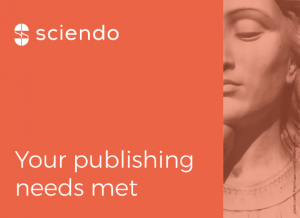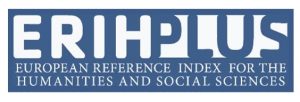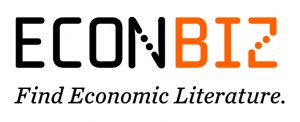
The Financial Internet Quarterly has established cooperation with Sciendo (previous name De Gruyter Open). Sciendo publishes English language journals and other periodicals in open access on behalf of research institutes, societies, universities and other organizations.
Publishing in all major academic disciplines, Sciendo is home to 435 scholarly journals and to over 100 books. Sciendo provides the opportunity for indexing journals by approx. 150 different abstracting databases, including Thomson Reuters and PubMed.
Publishing in all major academic disciplines, Sciendo is home to 435 scholarly journals and to over 100 books. Sciendo provides the opportunity for indexing journals by approx. 150 different abstracting databases, including Thomson Reuters and PubMed.
Abstracting/indexing databases:

The Emerging Sources Citation Index (ESCI) was launched by Thomson Reuters in 2015, and since 2017 the index has been produced by Clarivate Analytics. The Emerging Sources Citation Index aims to include in the Web of Science high-quality, peer reviewed publications. It ensures important research is visible in the Web of Science Core Collection. Impact Factor 2024: 0.500.

EBSCO – The EBSCO platform is one of the most well-known repositories in the world. It has provided this service for over 60 years, delivering the highest quality to its clients. The EBSCO database gathers and offers various types of electronic documents, including scientific articles, journals and books.

ProQuest one of the most well know repositories. It is a complex database containing full texts of over 11,500 journals as well as other material.

DOAJ (Directory of Open Access Journals) is a unique and extensive index of diverse open access journals from around the world, driven by a growing community, committed to ensuring quality content is freely available online for everyone.

ERIH PLUS is an academic journal index for the HSS (Humanities and Social Sciences) society in Europe. Database provide article search facilitated by Dimensions which allow exploration the 10 000 ERIH PLUS journals in detail. What is more, it mark the individual journals thoroughly with key information about for instance open access status and plan S compliance.

EconLit, American Economic Association’s electronic bibliography, an exceptionally rich repository of peer-reviewed articles, books, reviews, papers and dissertations from around the world.
Index Copernicus an internet portal created specifically for the needs of the academic community. It is characterized by a multi-parameter system of evaluation of collected research material.
Search engines, directories, aggregators and hosting:
The Central European Journal of Social Sciences and Humanities (CEJSH) a database of abstracts from periodicals in the Czech Republic, Slovakia and Hungary.
RePEc a project whose axis is a decentralized database of articles, programming and books. It does not contain the full text but provides links.
Ulrichsweb ™ is an unusally helpful source of bibliographic information. The database contains data from 300,000 various types of academic journals, including many which are research-based. Among them there are open access publications, peer-reviewed titles, newspapers and bulletins.

EconBiz – is a search – portal maintained by the German National Library for Economics (ZBW). It covers major databases in business and economics, including ECONIS and RePEc. EconBiz contains references to more than 8 million titles, especially journal articles, books and book chapters, working papers, electronic publications, and events.

Cabell Publishing, Inc. – was founded in 1978, to help professors, graduates and researchers in the publication of theirworks, in academic journals. To achievethis, the companyhas a database of contact information and links to the internetsites of many journals.

Gale, part of Cengage Learning, is a world leader in e-research and educational publishing for libraries, schools and businesses. Best known for its accurate and authoritative reference content as well as its intelligent organization of full-text magazine and newspaper articles. Gale creates and maintains more than 600 databases that are published online, in print, as eBooks.
BazEkon is a bibliometric software tool similar to Publish or Perish, which processes bibliographical annotations of articles registered in BazEkon database. This tool calculates the basic bibliometric characteristics (Hirsch index and number of citations) for authors and journals appearing in bibliographical annotations. The software was developed by IT department of the CUE Main Library.

ICM – Interdisciplinary Centre for Mathematical and Computational Modelling, as the centre of the Virtual Science Library programme, develops and makes available a wide range of publications, electronic information resources and scientific data. ICM’s operations are a significant element of the programme for the development of scientific IT infrastructure in Poland.
